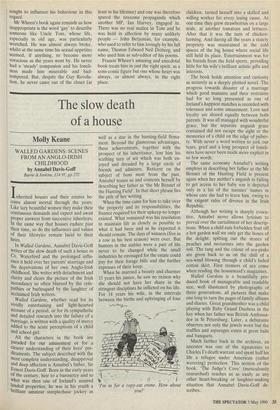The slow death of a house
Molly Keane
WALLED GARDENS: SCENES FROM AN ANGLO-IRISH CHILDHOOD by Annabel Davis-Goff Barrie & Jenkins, £14.95, pp.272 Inherited houses and their estates be- come almost mortal through the years. Like lazy beautiful women they make their continuous demands and expect and await proper answers from successive inheritors; In the same way that houses endure past their time, so do the influences and values of their lifestyles remain lucid to their heirs. .
In Walled Gardens, Annabel Davis-Goff writes of the slow death of such a house in Co. Waterford and the prolonged influ- ence it held over her parents' marriage and the deprivations of her own Anglo-Irish childhood. She writes with detachment and clarity and clears the picture of the Irish ascendancy so often blurred 'by the sym- pathies or burlesqued by the laughter of acclaimed Irish writers.
Walled Gardens, whether read for its vividly entertaining and light-hearted account of a period, or for its sympathetic and detailed research into the failure of a marriage, is written with a quality of mercy added to the acute perceptions of a child and school-girl. All the characters in the book are paraded for our amusement or for a clearer understanding of their lives' pre- dicaments. The subject described with the most complete understanding, disapproval and deep affection is Annabel's father, Sir Ernest Davis-Goff. Born in the early years of the century, heir to a baronetcy and to What was then one of Ireland's assured landed properties, he was in his youth a brilliant amateur steeplechaie jockey as well as a star in the hunting-field firma- ment. Beyond the glamorous advantages, these achievements, together with the prospect of his inheritance, lent him his scathing turn of wit which was both en- joyed and dreaded by a large circle of friends and admirers. Reticent on the subject of bons mots from the past, Annabel teases us and contents herself by describing her father as 'the Mr Bennet of the Hunting Field'. In that short phrase lies the pith of her writing. When the time came for him to take over the property and its responsibilities, the finance required for their upkeep no longer existed. What remained was his resolution to maintain life as closely as possible to what it had been and as he expected it should remain. The days of winners (five in a row in his best season) were over. But hunters in the stables were a part of life never to be changed while the small industries he envisaged for the estate could pay for their forage bills and the further expenses of their keep. When he married a beauty and charmer 15 years his junior, he saw no reason why she should not have her share in the stringent disciplines he inflicted on his life. For 14 years his wife, in the intervals between the births and upbringing of four `I'm in or a copy-cat crime. How about you?' children, turned herself into a skilled and willing worker for every losing cause. At one time they grew strawberries on a large scale, at another tomatoes and lettuces. After that it was the turn of chicken- farming. And during all the years a stately propriety was maintained in the cold spaces of the big house where social life still held its place. Entertainment was for his friends from the field sports, providing little for his wife's brilliant artistic gifts and interests.
The book holds attention and curiosity as securely as a deeply plotted novel. The progress towards disaster of a marriage which good manners and their restraints had for so long presented as one of Ireland's happiest matches is recorded with tolerance and some amusement. Love and loyalty are shared equally between both parents. It was all managed with wonderful grace, but the separate anguish grace contained did not escape the sight or the memories of a child on the edge of puber- ty. With never a word written to jerk our tears, grief and a long prospect of loneli- ness have never been made more explicit in so few words.
The same economy Annabel's writing employs in describing her father as the Mr Bennet of the Hunting Field is present again when her mother's anguish in failing to get access to her baby son is depicted only in a list of the nannies' names in whose care she had to leave him, owing to the exigent rules of divorce in the Irish Republic.
Although her writing is sharply evoca- tive, Annabel never allows lyricism to prevail over the curtailment of her descrip- tions. When a child eats forbidden fruit off a hot garden wall we only get the bones of the delight: spitting out the stones of peaches and nectarines into the garden soil. The tang and the colour of sea-pinks are given back to us on the chill of a sea-wind blowing through a child's faded cotton skirt. First tremors of sex come when reading the housemaid's magazines. Walled Gardens is a beautifully pro- duced book of manageable and readable size, well illustrated by photographs of three generations, all pictures that make one long to turn the pages of family albums and diaries. Great grandmother was a child playing with Baby Grand Duchess in the hay when her father was British Ambassa- dor in St Petersburg. Later, a debutante observes not only the jewels worn but the truffles and asparagus eaten at great balls and banquets.
Much farther back in the archives, an ancestor was one of the signatories to Charles I's death warrant and spent half his life a refugee under American (rather wavering) protection. This section of the book, 'The Judge's Cove' (meticulously researched) reaches us as easily as any other heart-breaking or laughter-making situation that Annabel Davis-Goff de- scribes.


















































 Previous page
Previous page